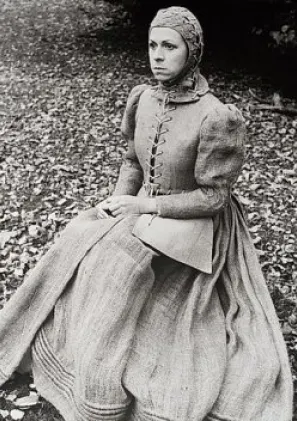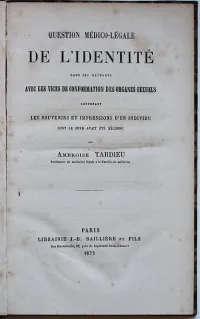Biography
1838 - 1868
“May you hear my feeble voice! It will tell you that here below there is a heart full of the memory of you.”
– Herculine Barbin
Herculine Adélaîde Barbin was born into a poor family in Saint-Jean-d’Angely, France on November 8, 1838. She was raised as a girl and at a young age went to study at a convent. In her late teens, she earned a position as an assistant teacher in a girl's school. There she fell in love with another teacher who soon realized Herculine was not made like other girls. Herculine was forced to resign and undergo a medical examination by authorities. The doctor discovered that although Barbin had a small vagina, her body was masculine with a very small penis and testicles inside her body. Barbin was reclassified a male and subsequently changed his name to Abel. Press coverage of the incident prompted Abel to escape the notoriety and move to Paris. Alone, agonized at having his secret revealed and shamed for being who he was, Barbin was desolate. He lived in poverty and spent his time writing his memoirs, using female pronouns when writing about life prior to sexual re-designation and male pronouns following the declaration. In February 1868, at age 29, Barbin died by suicide via carbon monoxide poisoning from a small stove in his flat. The memoirs were found beside his bed. The diary has been used by academics in regards to gender issues since 1872 when portions of the text were published as The Story and Memoirs of Alexina B in the book Forensics of Identity Involving Deformities of the Sexual Organs, Along With the Memoirs and Impressions of an Individual Whose Sex Was Misidentified. In the 1970s, Michel Foucault discovered Barbin’s memoirs and republished them with commentary as Herculine Barbin: Being the Recently Discovered Memoirs of a Nineteenth Century French Hermaphrodite. Barbin’s life has inspired a number of films, plays, and books including Jeffery Eugenides’ Pulitzer Prize winning novel Middlesex. However, perhaps the greatest legacy of Herculine Barbin is having their birthday, November 8, celebrated as Intersex Day of Remembrance.
1838 - 1868
“May you hear my feeble voice! It will tell you that here below there is a heart full of the memory of you.”
– Herculine Barbin
Herculine Adélaîde Barbin was born into a poor family in Saint-Jean-d’Angely, France on November 8, 1838. She was raised as a girl and at a young age went to study at a convent. In her late teens, she earned a position as an assistant teacher in a girl's school. There she fell in love with another teacher who soon realized Herculine was not made like other girls. Herculine was forced to resign and undergo a medical examination by authorities. The doctor discovered that although Barbin had a small vagina, her body was masculine with a very small penis and testicles inside her body. Barbin was reclassified a male and subsequently changed his name to Abel. Press coverage of the incident prompted Abel to escape the notoriety and move to Paris. Alone, agonized at having his secret revealed and shamed for being who he was, Barbin was desolate. He lived in poverty and spent his time writing his memoirs, using female pronouns when writing about life prior to sexual re-designation and male pronouns following the declaration. In February 1868, at age 29, Barbin died by suicide via carbon monoxide poisoning from a small stove in his flat. The memoirs were found beside his bed. The diary has been used by academics in regards to gender issues since 1872 when portions of the text were published as The Story and Memoirs of Alexina B in the book Forensics of Identity Involving Deformities of the Sexual Organs, Along With the Memoirs and Impressions of an Individual Whose Sex Was Misidentified. In the 1970s, Michel Foucault discovered Barbin’s memoirs and republished them with commentary as Herculine Barbin: Being the Recently Discovered Memoirs of a Nineteenth Century French Hermaphrodite. Barbin’s life has inspired a number of films, plays, and books including Jeffery Eugenides’ Pulitzer Prize winning novel Middlesex. However, perhaps the greatest legacy of Herculine Barbin is having their birthday, November 8, celebrated as Intersex Day of Remembrance.
Demography
Demography
Gender Male
Sexual Orientation Queer
Gender Identity Intersex
Ethnicity Caucasian/White
Faith Construct Catholic
Nations Affiliated France
Era/Epoch Victorian Era (1837-1901)
Field(s) of Contribution
Author
Education
World History
Commemorations & Honors
Annual Intersex Day of Remembrance Commemorated on Barbin's Nov. 8th Birthday
Demography
Gender Male
Sexual Orientation Queer
Gender Identity Intersex
Ethnicity Caucasian/White
Faith Construct Catholic
Nations Affiliated France
Era/Epoch Victorian Era (1837-1901)
Field(s) of Contribution
Author
Education
World History
Commemorations & Honors
Annual Intersex Day of Remembrance Commemorated on Barbin's Nov. 8th Birthday
Resources
Resources
Foucault, Michel. Herculine Barbin: Being the Recently Discovered Memoirs of a Nineteenth-century French Hermaphrodite. New York: Vintage Publishing, 1980.
http://en.wikipedia.org/wiki/Herculine_Barbin
https://en.wikipedia.org/wiki/Herculine_Barbin_(memoir)
http://oii.org.au/4232/intersex-solidarity-day-sunday-8th-november/
http://thediaryjunction.blogspot.com/2008/11/barbin-hermaphrodite.html
https://intersexday.org/en/starry-starry-night-herculine-barbin/
Resources
Foucault, Michel. Herculine Barbin: Being the Recently Discovered Memoirs of a Nineteenth-century French Hermaphrodite. New York: Vintage Publishing, 1980.
http://en.wikipedia.org/wiki/Herculine_Barbin
https://en.wikipedia.org/wiki/Herculine_Barbin_(memoir)
http://oii.org.au/4232/intersex-solidarity-day-sunday-8th-november/
http://thediaryjunction.blogspot.com/2008/11/barbin-hermaphrodite.html
https://intersexday.org/en/starry-starry-night-herculine-barbin/



